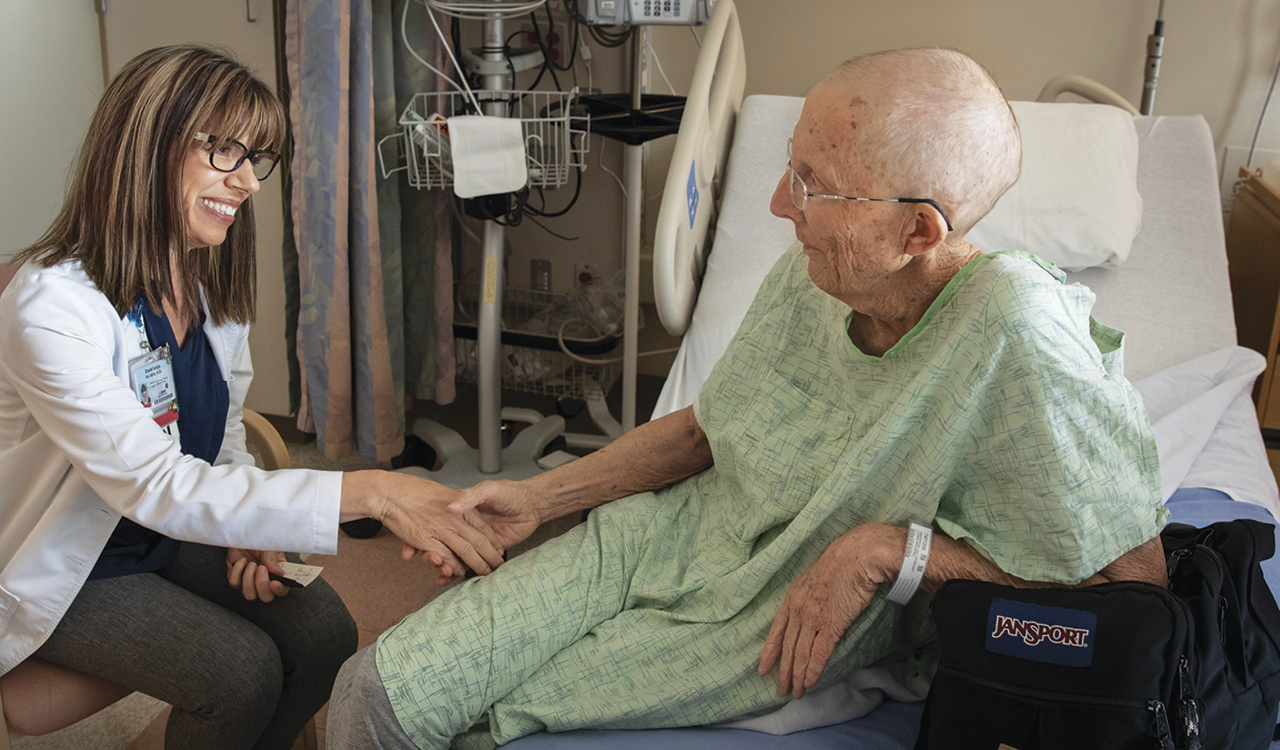“Just like having an angel”
Nurse navigators clear paths for patients
Michael and Donna Long spent Easter Sunday in a Marysville emergency room. Blood tests and a PET scan revealed Mr. Long had non-Hodgkin lymphoma — a diagnosis that left the couple in a hopeless daze. With support from oncology nurse navigators at the UC Davis Comprehensive Cancer Center, the Longs learned to manage what once felt like an impossible situation.
“I was in bad shape,” the retired police officer says. “It felt like I was in a car accident or some other terrible tragedy.”
Oncology nurse navigators help patients and their caregivers through what can be a complicated and grueling journey. Cancer care is complex and involves multiple transitions that require fine-tuned, interdisciplinary collaboration. Some patients are homeless, without financial support or a caregiver, or don’t speak English, which makes a challenging diagnosis more worrisome. Nurse navigators work to remove barriers to care with insurance providers, coordinate their tests or treatments with outside clinics or hospitals and personalize cancer care.
“A sick person can’t take care of themselves,” Mr. Long says. “Then there’s the bureaucracy to deal with. All the words — they weren’t in my vocabulary.”
Rideout Health, where Mr. Long was diagnosed, transferred him to UC Davis Medical Center for six rounds of inpatient chemotherapy. The 21-day cycle is intense. He spends five days a month connected to an IV bag filled with clear, cancer-killing liquid, and gets a white blood cell booster shot to reduce his risk for infection 48–72 hours after he leaves the hospital. Today, the Longs feel far less bewildered.
“It’s not a world anyone can navigate alone,” says Mrs. Long. “I can’t tell you how wonderful it is to have someone guide you through the most horrible experience.”
It’s the first day of Mr. Long’s fifth cycle and his oncology nurse navigator, Teri Lown, greets him in his hospital bed. He shows her a photo of the newest addition to his family while she asks how he’s feeling. A smile washes over Lown’s face as she looks at the tiny newborn with a full head of hair on Mr. Long’s phone.
“I don’t know how she (Lown) remembers everybody,” Mr. Long says. “She gives me a hug, it makes me feel good. She understands what I’m going through.”
This is routine for Lown and counterpart Carol Leija. Each morning, they walk from their office at the Cancer Center to the Medical Center, where they “huddle” with nurses and physicians. In a crowded room on the eighth floor, they listen to status updates on patients, including Mr. Long, and take notes. When the group disperses, Lown and Leija divide and conquer one case at a time.
“We function in a place where we listen, seek to understand and find how we can best connect the patient with what they need,” Leija says. “We have months of relationships with our patients — emotional support, getting them into palliative care, or just being there.”
Mr. Long doesn’t remember much of the first six weeks after his diagnosis, and he’s grateful the nurse navigators helped him and his wife through the tough period.
“It’s so overwhelming and confusing dealing with different hospitals and different doctors, and it takes a while to get things set up,” Mr. Long says. “It just doesn’t happen. Teri made it (the process) so much easier.”
Every patient need is different. For the Longs, who are grandparents of three, the 90-mile roundtrip drive from Yuba City several times per week was challenging. Lown contacted the clinic at Rideout to ensure Mr. Long could get blood tests and his booster shot closer to home.
“Twenty-five percent of cancer patients need an outside connection,” Lown says. “We want them to stay at UC Davis, but that doesn’t always happen. When they go back home, they need help setting up care.”
Lown and Leija manage 240 cases annually and meet 10–12 newly diagnosed cancer patients every month through the Oncology Nurse Navigator Program. Every person they work with adheres to their personal treatment plan.
More than half of people in the program come into the hospital with leukemia. They require immediate attention because they are in “blast” crisis, or their bone marrow is full of cancer cells. In urgent cases like these, patients spend about a month in the hospital for chemotherapy.
“Acute leukemia and lymphoma patients can’t go two days without a blood check,” Leija says. “It’s easy to fall through the cracks.”
The team also supports physicians. UC Davis hematologist- oncologist Brian Jonas considers the program vital, and credits the navigators’ work for excellent patient care and satisfaction.
“Teri and Carol are caring, dedicated and passionate. They spend a lot of time with patients, families and caregivers when they are scared, overwhelmed and in shock,” Jonas says. “They do an amazing job of navigating patients by comforting and educating them, and giving them hope for the future.”
The program is likely to expand. The team hopes to upgrade existing nurse navigation software that reflects new metrics published by the Academy of Oncology Nurse Navigators to better track patient and hospital needs and expectations. They also want to grow the program to reach patients with solid tumors.
For their part, the Longs are grateful the program was there when he was in crisis.
“I feel like things are under control now, and I can see some daylight,” Mr. Long says.
Adds his wife, “It’s just like having an angel.”


